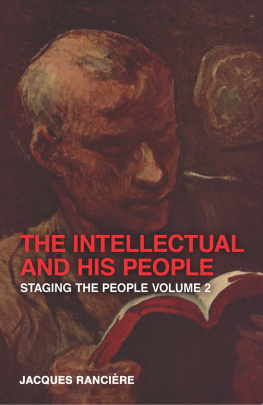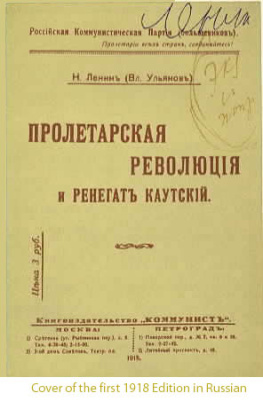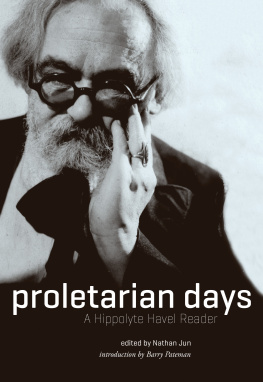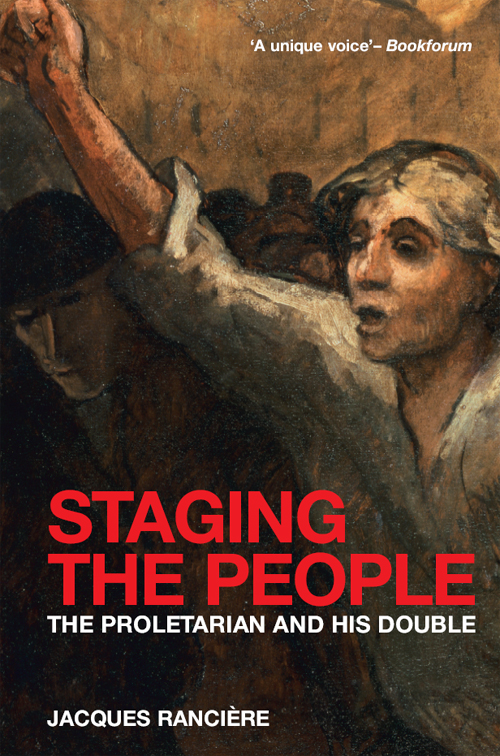STAGING THE PEOPLE
STAGING THE PEOPLE
THE PROLETARIAN AND HIS DOUBLE
Jacques Rancire
Translated by David Fernbach

First published in English by Verso 2011
Verso 2011
Compiled from articles originally appearing in Les Rvoltes logiques
Les Rvoltes logiques 1975 to 1981
Translation David Fernbach 2011
All rights reserved
The moral rights of the author have been asserted
1 3 5 7 9 10 8 6 4 2
Verso
UK: 6 Meard Street, London W1F 0EG
US: 20 Jay Street, Suite 1010, Brooklyn, NY 11201
www.versobooks.com
Verso is the imprint of New Left Books
Epub ISBN-13: 978-1-84467-805-1
British Library Cataloguing in Publication Data
A catalogue record for this book is available from the British Library
Library of Congress Cataloging-in-Publication Data
A catalog record for this book is available from the Library of Congress
Typeset by Hewer Text UK Ltd, Edinburgh
Printed in the US by Maple Vail
Contents
Preface to the English Edition
Collected in this book and its companion volume, The Intellectual and His People, are almost all the articles I wrote between 1975 and 1985 for the journal Les Rvoltes logiques, and for the books later published by the collective of the same name. It is doubtless today necessary to explain the nature of this publication and the intellectual and political dynamic in which it was located. Its starting-point was the desire to draw conclusions from the time around 1968. The May explosion, in which student action acted as the detonator for a mass strike, had overturned Marxist schemas of class consciousness and action. The great Althusserian project of a struggle of science against ideology clearly turned out to be a struggle against the potential strength of mass revolt. The inability of the far-left groups to build a new revolutionary workers movement in the wake of the May revolt forced us to measure the gap between the actual history of social movements and the conceptual system inherited from Marx. It was on the basis of this twin situation that I embarked in 1972 on a research project that aimed to retrace the history of working-class thought and the workers movement in France, in order to grasp the forms and contradictions that had characterized its encounter with the Marxist ideas of class struggle and revolutionary organization. This was the basis on which I set up in 1973, along with Jean Borreil and Genevive Fraisse, a Centre de Recherches sur les Idologies de la Rvolte, which two years later gave birth to the periodical which we initially conceived as a place for publishing our work.
But the intellectual and political landscape was changing rapidly at this time. And our critical stance towards Marxist dogmatism found itself confronting in 1975 two forms of struggle against the same dogmatism that were each far more influential but also equally removed from our own perspective. On the one hand, distancing oneself from the great beliefs and enthusiasms of Marxist activists found expression in the rediscovery of a people that was both more firmly rooted and more light-hearted, more playful, than the austere proletariat of Marxist theory. This was the period in which a new enthusiasm for popular culture made itself felt in France, with a profusion of monographs on folkloric customs and biographies of men of the people who were proud of their trade and their traditions. This new tendency marked the cinema as well as academic history, with the success of retro films. The break with forms of activist authority was also expressed in the ubiquitous praise for traditional festivals and the evocation of popular carnivals and plebeian leisure activities. The article I jointly authored in the first issue of Les Rvoltes logiques, Off to the Exhibition, thus echoed a successful play of that year, En rvenant d lExpo, which itself took its title from a popular song of 1900 and re-immersed the glorious proletarian body in a world in which machines were a magical spectacle as well as the embodiment of Marxian productive forces, and the workers identity was a matter of imagery and song as well as for the science of class struggle. Depicted in this way, in place of the strict proletarian of Marxist science we had a noisy and colourful people, reminiscent of what leftist activists glimpsed in their efforts to plumb the depths of the pays rel, but also a people that conformed well to its essence, well rooted in its place and time, ready to move from the heroic legend of the poor to the positivity of silent majorities. These people, in fact, was the imaginary correlate of the socialist intelligentsia that was about to take power in 1981.
As opposed to this soft liquidation of proletarian rigour, however, there was also the start of a far more radical operation. At the time we were preparing the first issue of the periodical, French intellectual opinion was noisily celebrating the conversion of Andr Glucksmann, former spokesperson for the enrags of May 1968 and the Maoists of La Gauche Proltarienne, who published under the title La Cuisinir et le mangeur (The Cook and the Cannibal) the first manifesto of those new philosophers who went on to build their fame on denouncing concentration-camp Marxism and identifying with its victims. From this side, the revolutionary people was liquidated en bloc, turned into pure embodiment of the Marxist dream of mastery, pure justification for the mass crime of the gulag. On the one hand, the denunciation of master-thinkers simply revivified the old reactionary discourse for which dreams of purity and social justice necessarily lead to the crimes of totalitarianism. But, on the other hand, the purity denounced immediately resurfaced in a new guise when Glucksmann and his colleagues opposed to concentration-camp Marxism a plebs endowed with a constitutive virtue of resistance to the assaults of that leviathan power whose final avatar was the Soviet state. The new embodiments of the popular body that the supposed new philosophers opposed to Marxism actually reconstituted the same dubious alliance between positive and negative on which Marxism itself lived. And once again the celebration of the suffering and struggling people served to benefit its self-proclaimed representatives. The proletarian intellectuals speaking in the name of the builders of a new world were replaced by the new dissident intellectuals speaking in the name of the victims of that new world.
It was not enough at this point to oppose proletarian dogmatism with the complexities and contradictions of actual movements of social and popular struggle. The issues at stake in these transformed figures of the people and the plebs had also to be grasped. In the guise of a critique of Marxism a strange operation was carried out, keeping all the dogmatism of a priori oppositions and the power of self-proclaimed vanguards, while simply dropping the struggles and emancipatory project to which these had been attached. The turns and shifts that Les Rvoltes logiques proposed thus followed a demand that was simple in principle, even if it implied in practice a battle on several fronts: to prevent the liquidation of a certain way of thinking about revolution from dispensing with an understanding of the issues, complexities and contradictions of two centuries of struggle.
It proclaimed, via the poet of Jeanne-Maries Hands, a fidelity to the Paris Commune that was the very archetype of rebellion. But this was via the detour of a we that inverted the usual function of the first person: that of attesting to the presence of the person speaking, ensuring the embodiment of the meaning that activist discourse presupposes.










